Germany is marking the 75th anniversary of the most famous plot to kill Adolf Hitler, honoring those who resisted the Nazis — who were stigmatized for decades as traitors — as pillars of the country's modern democracy amid growing concerns about the resurgence of the far-right.
Chancellor Angela Merkel, who will speak Saturday at an annual swearing-in ceremony for some 400 troops before addressing a memorial event, paid tribute ahead of the anniversary to executed plot leader Col. Claus von Stauffenberg and his fellow conspirators and highlighted their importance to modern Germany.
"Only if we understand our past can we build a good future," she said.

In this Friday, July 12, 2019 photo a wreath fixed under a remembrance plaque marking the place where several leaders of the failed assassinate to Adolf Hitler on July 20, 1944 was shoot dead, in the courtyard of the Bendlerblock building of the German defensive ministry, in Berlin. Germany is marking the 75th anniversary of the most famous plot to kill Adolf Hitler. (AP PhotoMarkus Schreiber)
Von Stauffenberg tried to kill Hitler with a briefcase bomb on July 20, 1944, during a meeting at his headquarters in East Prussia. Hitler escaped the full force of the blast when someone moved the briefcase next to a table leg, deflecting much of the explosive force. The plot crumbled when news spread that Hitler had survived. Von Stauffenberg and his fellow plotters were executed within hours.
The story had little resonance in the immediate post-World War II years, when many still viewed the July 20 plotters as traitors, as they had been painted by the Nazis in the aftermath of the failed assassination.
The resistance against the Nazis only came to be "laboriously accepted" over subsequent decades, said Johannes Tuchel, director of the German Resistance Memorial Center, and even in the 1980s many believed its memory would fade away. Only in 2004 did a survey show that a majority of Germans believe the resistance to the Nazis is "important for our political culture," he added.

In this Friday, July 12, 2019 photo a sculpture and a remembrance plaque placed in the courtyard of the Bendlerblock building of the German defensive ministry where the German Resistance Memorial Center is located, in Berlin. Several leaders of the failed assassinate to Adolf Hitler on July 20, 1944 was shoot dead in the courtyard. The inscription reads: 'You did not bear the shame, you defend yourself, you gave the big eternal watch, a sign of repentance, your sacrificing your hot life for freedom right and honor'. (AP PhotoMarkus Schreiber)
"Those who acted on July 20 are an example to us, because they showed that they followed their conscience and set their stamp on a part of German history that otherwise was defined by the darkness of Nazism," Merkel said last week in her weekly video message.
Tuchel said von Stauffenberg is a "symbolic figure" of the resistance, an officer who evolved from supporting Nazi policies to becoming a ferocious opponent of the regime after Hitler's invasion of the Soviet Union in 1941. He acknowledged that the resistance within the German military was, in overall terms, tiny: 200 to 300 people were involved in the July 20 plot. The German military had some 8 million men under arms at the time, and only "a handful or two" of its more than 1,000 generals and admirals participated.
But the memorial Tuchel heads, in the Berlin complex where von Stauffenberg worked and was executed, seeks to display the full breadth of German resistance to Hitler's regime after the Nazis took power in 1933.

In this Friday, July 12, 2019 photo pictures of co-conspirators of the failed July 20, 1944 assassination to Adolf Hitler displayed at the exhibition of the German Resistance Memorial Center inside the Bendlerblock building a part of the German defensive ministry in Berlin. (AP PhotoMarkus Schreiber)
Students in Munich formed the White Rose movement, distributing pamphlets urging "passive resistance" starting in 1942. Its leaders included siblings Hans and Sophie Scholl, who were executed in 1943 and also have become resistance icons.
Helmuth James von Moltke's so-called Kreisau Circle started working in secret to end the dictatorship in 1940. And in 1938, carpenter Georg Elser attempted to kill Hitler and other senior Nazi leaders at an event in Munich, but was thwarted as the Nazi leader unexpectedly left the room minutes before a bomb exploded.
Tuchel conceded that, even now, there are shortcomings in historians' knowledge of the resistance and promised more research in the coming years into the role of women who opposed the Nazi dictatorship, responding to a recent call from parliament.

In this Friday, July 12, 2019 photo general view inside the courtyard of the Bendlerblock building of the German defensive ministry where the German Resistance Memorial Center is located, in Berlin. Several leaders of the failed assassinate to Adolf Hitler on July 20, 1944 was shoot dead in the courtyard. (AP PhotoMarkus Schreiber)
This year's anniversary comes amid a spike in concerns about rising numbers of far-right extremists in Germany, weeks after the killing of a regional official from Merkel's party who had supported the chancellor's welcoming approach to migrants. An extremist with previous convictions for violent anti-migrant crime has been arrested as the suspected killer.
"Today, we are obliged to confront all tendencies that want to destroy democracy — including right-wing extremism," Merkel said in her message on the July 20 plot.
Historians worry about efforts by far-right groups in Germany and parts of the hard-line nationalist Alternative for Germany party, or AfD, to appropriate the resistance for their own ends. AfD entered the national parliament in 2017 and its support in the polls stands above 10%. In 2017, a local AfD association came up with an ad claiming that "Sophie Scholl would vote for AfD," co-opting the name of the White Rose activist in a widely decried attempt to legitimize the party by implying that Merkel's government is a dictatorship.
Robert von Steinau-Steinrueck, the head of the July 20, 1944 Foundation — which started in 1949 to support the plotters' families — denounced such "attempts at fraudulent labeling, mixing up opposition in democracy with resistance to a dictatorship just because some people don't like the result of democratic processes."
PARIS (AP) — French President Emmanuel Macron warned Thursday that Europe could “die” if it fails to build its own robust defense as Russia’s war in Ukraine rages on, or if it fails to undertake major trade and economic reforms to compete with China and the U.S.
Macron urged Europeans to become more ambitious in a fast-changing world to face the challenges of war, fierce trade competition, energy scarcity, climate change and increasing authoritarianism.
In a nearly two-hour speech at Sorbonne University in Paris, Macron said that the continent is divided and “too slow and lacks ambition” at a time when the 27-member European Union needs to become a superpower, defend its own borders and speak with one voice if it wants to survive and thrive.
“Our Europe today is mortal,” Macron said. “It can die and that depends solely on our choices,” he added. He called on people to make those choices now because, “it’s today that Europe is between war and peace.”
Russia's full-scale invasion of Ukraine, now in its third year, is an existential threat and Europe isn't armed enough to defend itself when “confronted by a power like Russia that has no inhibitions, no limits,” Macron said.
‘Our ability to ensure our security is at stake," Macron said. “Russia mustn’t be allowed to win.”
Europe now has the “good fortune” of having the Biden administration’s commitment to supporting Ukraine, Macron said. But, in a year of key elections around Europe, in the U.S. and elsewhere, support may fragment or disappear entirely, he added.
“Europe must become capable of defending its interests, with its allies by our side whenever they are willing, and alone if necessary,” Macron said.
Strong armies, a European rapid intervention program and force, tanks, a missile shield and other weapons, produced in Europe, will need the support of “a joint diplomatic force that will speak with one voice and build bridges with Africa and Latin America,” the French leader said.
“Only then will Europe show that it's not a United States’ lap dog, and that it also knows how to talk to other regions of the world,” he said.
France has been a firm supporter of Ukraine in its fight against Russian aggression, and Macron has often clashed with other Western leaders as he has insisted that Europe must stand by the country at any cost. The French president alarmed European leaders by saying recently that sending Western troops into Ukraine to shore up its defenses shouldn’t be ruled out.
Referring to trade practices of China and the U.S., Macron said “the two world powers have decided not to respect the rules of global trade” by shoring up protections and subsides while Europe’s industry remains open and is stuck in overregulation.
“Let’s do the same, we are in competition,” Macron said.
“We must buy faster, we must produce more and we must buy more that is made in Europe. That is key,” Macron said.
Thursday's speech came less than two months before a pivotal European Parliament election.
Macron, an avid advocate of a united and assertive Europe, also rallied support for his centrist Renaissance party before the June 6-9 vote as far-right parties lead the moderate coalitions in the polls. He called for safeguarding democratic values as the “authoritarian model” was becoming “more popular” across the continent.
The war in Ukraine and immigration are top priorities for European Union voters, according to polls. Far-right parties have gained support by criticizing Macron’s government policies on both issues. Macron acknowledged divisions on immigration policies, including on asylum and deportation rules for those who have arrived to Europe illegally.
He emphasized the need for an effective response and Europe-wide coordination for curbing illegal immigration, closer cooperation with immigrants' countries of origin and a unified, relentless fight against human traffickers.
Macron criticized the idea of striking an agreement, as Britain as done, with countries in Africa and elsewhere to transfer immigrants there.
“This is a betrayal of our values that ultimately leads us to dependency on other counties,” Macron said.
The British government earlier this week approved a law allowing the deportation of some migrants who enter the country illegally to Rwanda.
Macron lost his majority in France’s most influential house of parliament, the National Assembly, after the 2022 election to the far-left coalition and the far-right National Rally party.
The social situation in France remains tense as Paris prepares to host the Olympic Games this summer, amid protests from teachers and police officers, and farmer demonstrations in recent weeks. The protests follow huge rallies last year against Macron’s ultimately successful proposal to increase the retirement age from 62 to 64.
Barbara Surk reported from Nice, France. Lorne Cook contributed to this report from Brussels.
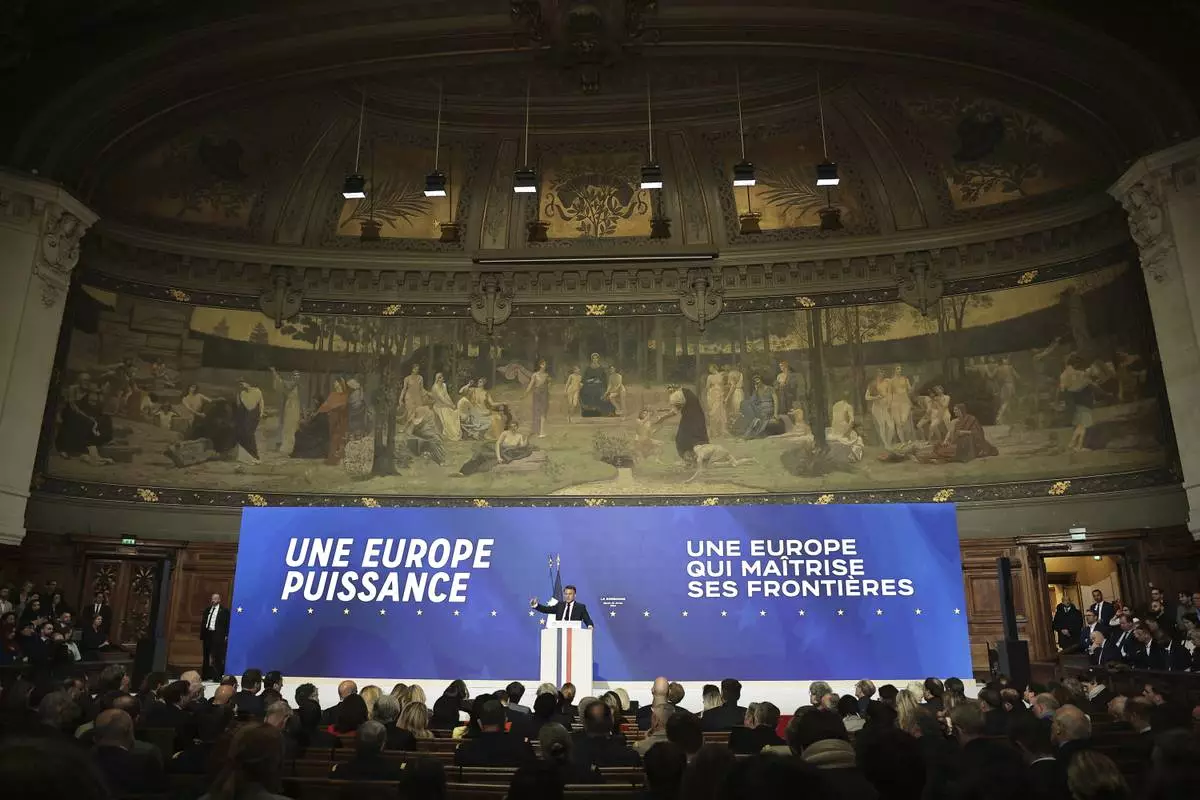
French President Emmanuel Macron delivers a speech on Europe in the amphitheater of the Sorbonne University, Thursday, April 25 in Paris. 2024. French President Emmanuel Macron will outline his vision for Europe as a more assertive global power at the backdrop of war in Ukraine, security, and economic challenges in a speech ahead of pivotal election for the European Parliament in June. (Christophe Petit Tesson, Pool via AP)
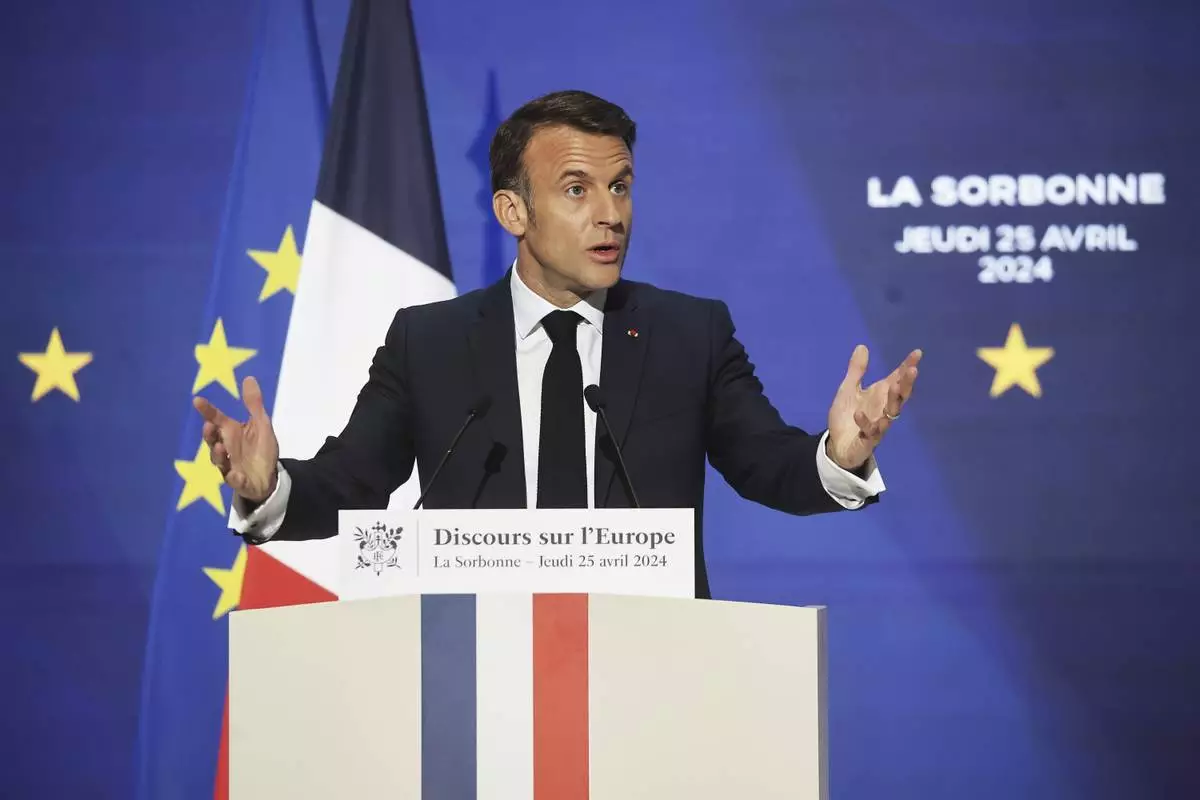
French President Emmanuel Macron delivers a speech on Europe in the amphitheater of the Sorbonne University, Thursday, April 25 in Paris. 2024. French President Emmanuel Macron will outline his vision for Europe as a more assertive global power at the backdrop of war in Ukraine, security, and economic challenges in a speech ahead of pivotal election for the European Parliament in June. (Christophe Petit Tesson, Pool via AP)
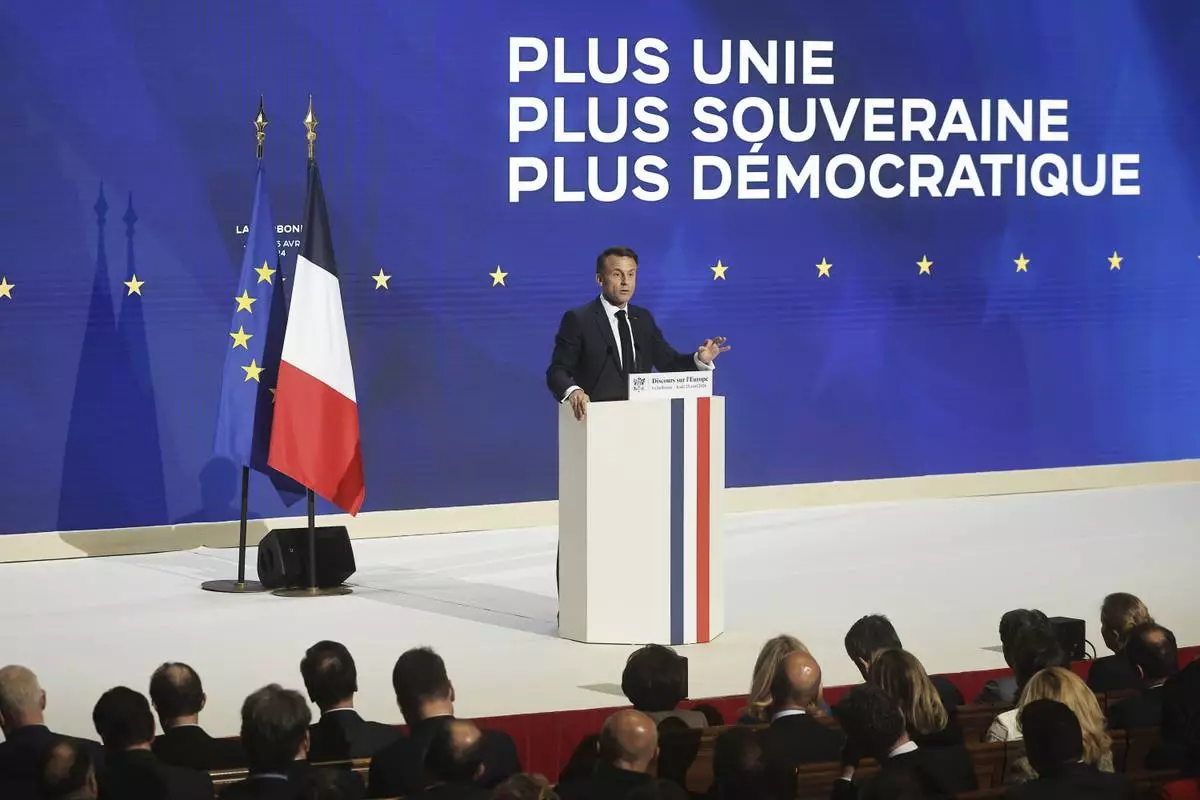
French President Emmanuel Macron delivers a speech on Europe in the amphitheater of the Sorbonne University, Thursday, April 25 in Paris. 2024. French President Emmanuel Macron will outline his vision for Europe as a more assertive global power at the backdrop of war in Ukraine, security, and economic challenges in a speech ahead of pivotal election for the European Parliament in June. (Christophe Petit Tesson, Pool via AP)
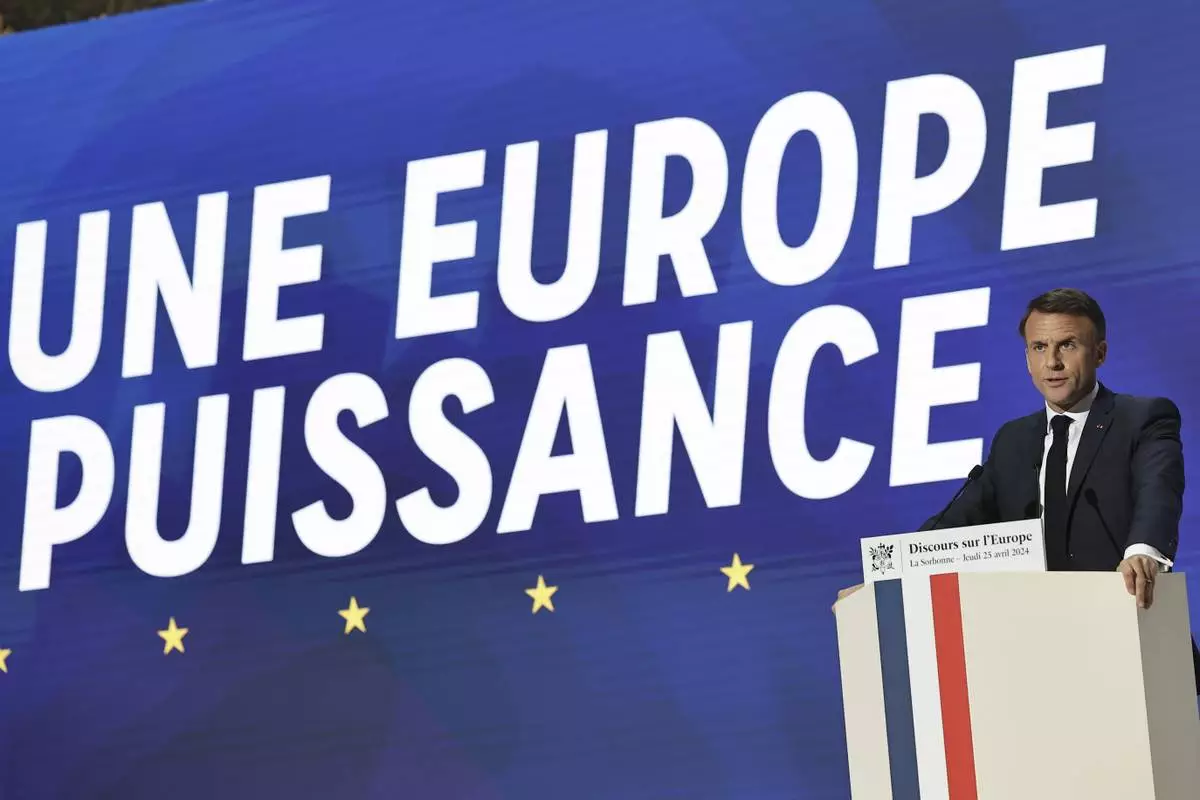
French President Emmanuel Macron delivers a speech on Europe in the amphitheater of the Sorbonne University, Thursday, April 25 in Paris. 2024. French President Emmanuel Macron will outline his vision for Europe as a more assertive global power at the backdrop of war in Ukraine, security, and economic challenges in a speech ahead of pivotal election for the European Parliament in June. (Christophe Petit Tesson, Pool via AP)
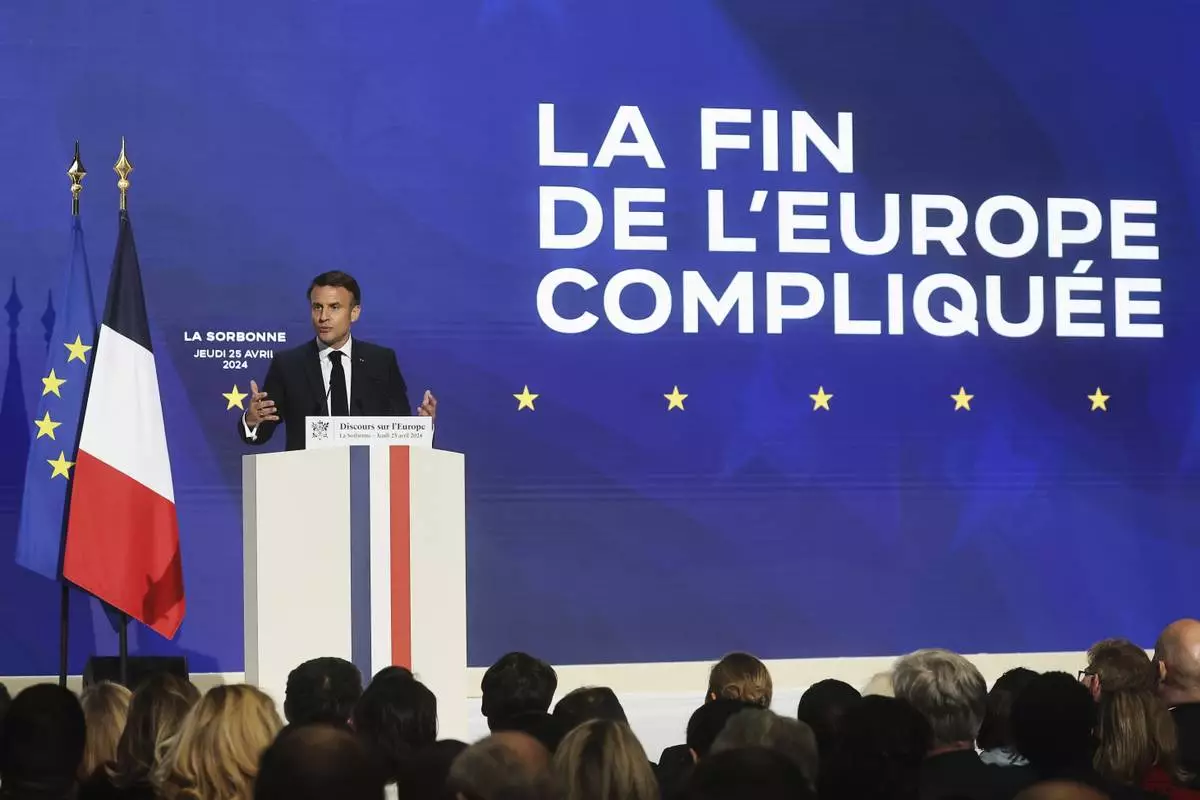
French President Emmanuel Macron delivers a speech on Europe in the amphitheater of the Sorbonne University, Thursday, April 25 in Paris. 2024. French President Emmanuel Macron will outline his vision for Europe as a more assertive global power at the backdrop of war in Ukraine, security, and economic challenges in a speech ahead of pivotal election for the European Parliament in June. (Christophe Petit Tesson, Pool via AP)
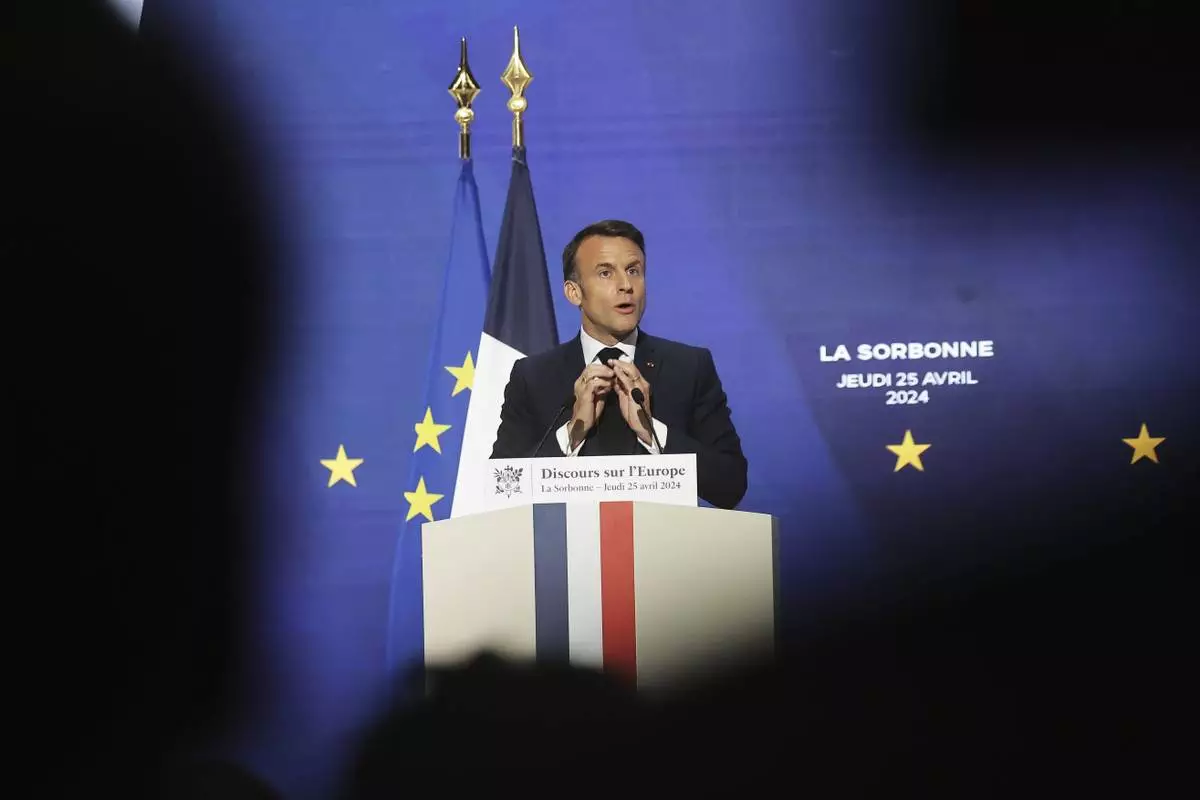
French President Emmanuel Macron delivers a speech on Europe in the amphitheater of the Sorbonne University, Thursday, April 25 in Paris. 2024. French President Emmanuel Macron will outline his vision for Europe as a more assertive global power at the backdrop of war in Ukraine, security, and economic challenges in a speech ahead of pivotal election for the European Parliament in June. (Christophe Petit Tesson, Pool via AP)
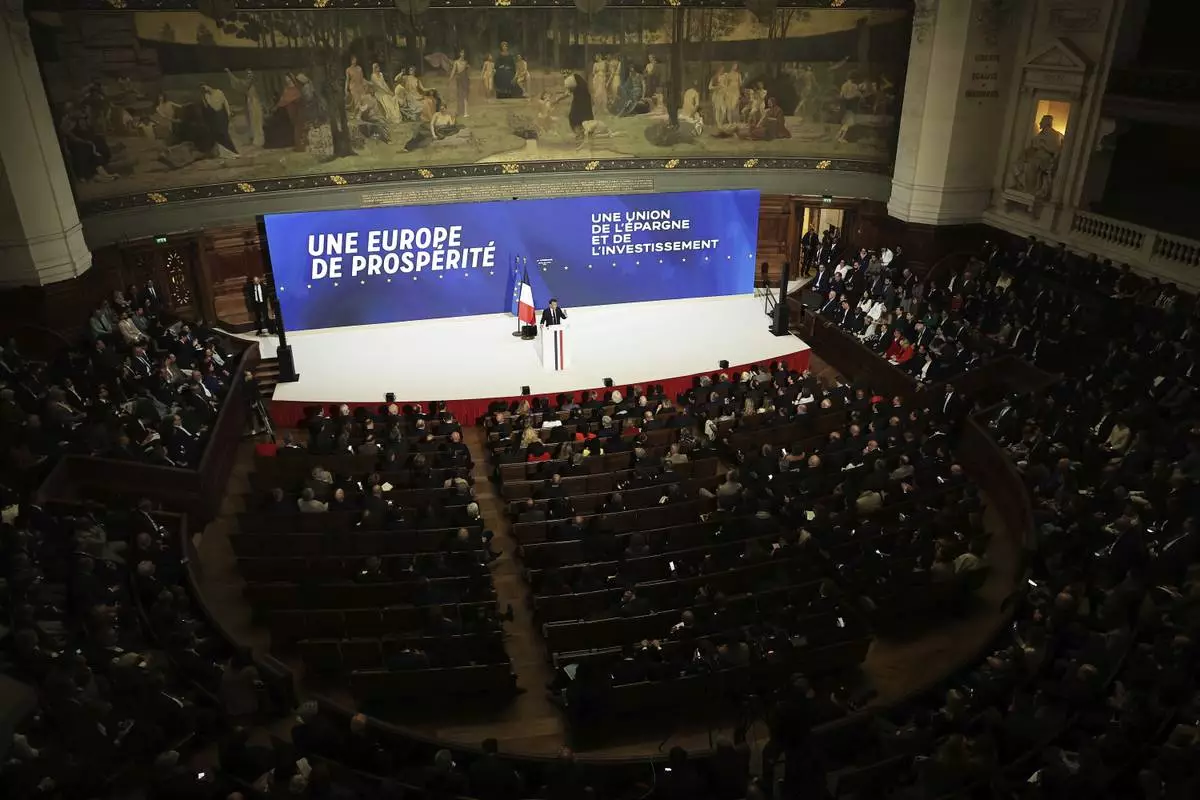
French President Emmanuel Macron delivers a speech on Europe in the amphitheater of the Sorbonne University, Thursday, April 25 in Paris. 2024. French President Emmanuel Macron will outline his vision for Europe as a more assertive global power at the backdrop of war in Ukraine, security, and economic challenges in a speech ahead of pivotal election for the European Parliament in June. (Christophe Petit Tesson, Pool via AP)
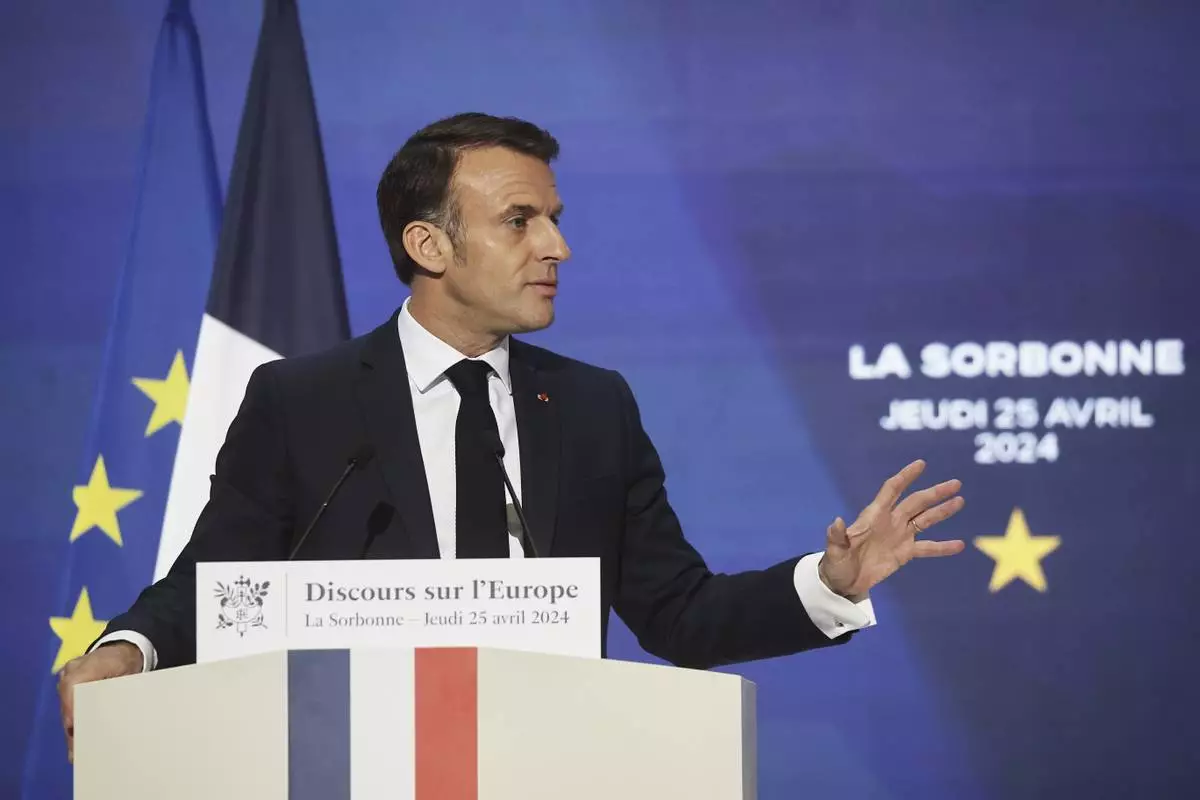
French President Emmanuel Macron delivers a speech on Europe in the amphitheater of the Sorbonne University, Thursday, April 25 in Paris. 2024. French President Emmanuel Macron will outline his vision for Europe as a more assertive global power at the backdrop of war in Ukraine, security, and economic challenges in a speech ahead of pivotal election for the European Parliament in June. (Christophe Petit Tesson, Pool via AP)
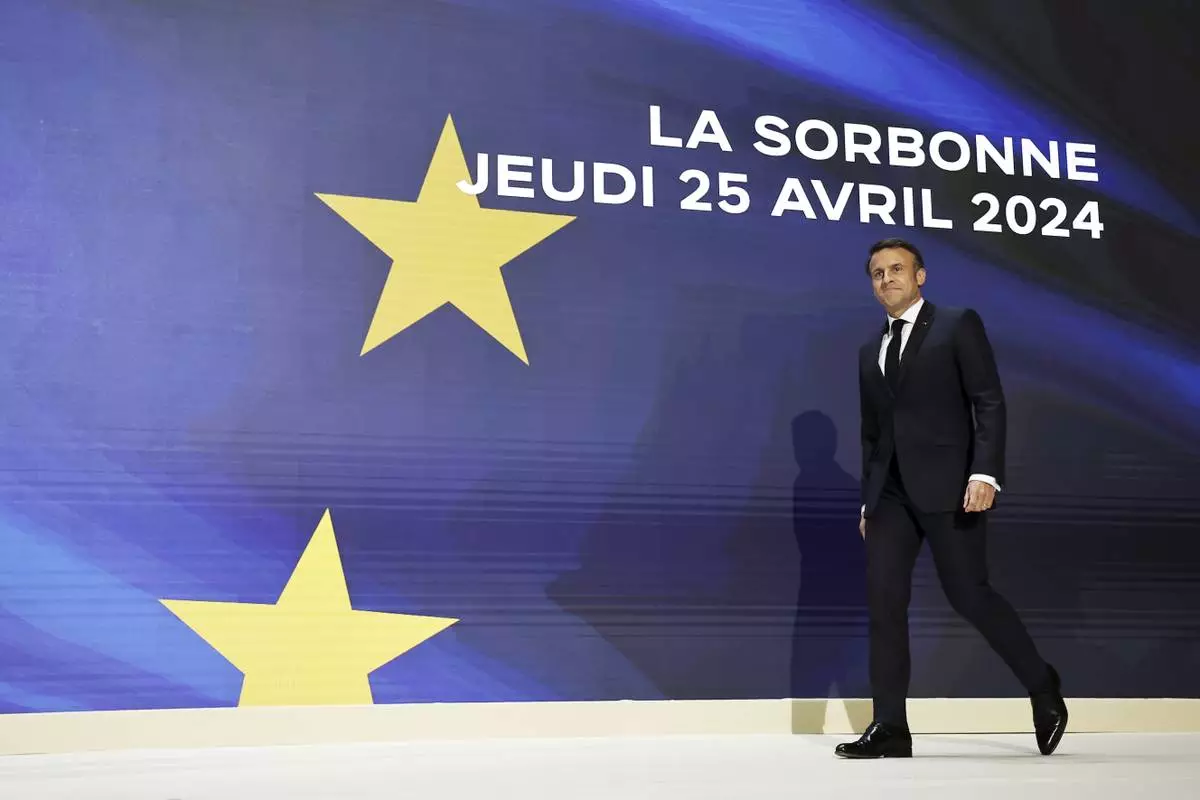
French President Emmanuel Macron arrives to deliver a speech on Europe in the amphitheater of the Sorbonne University, Thursday, April 25 in Paris. 2024. French President Emmanuel Macron will outline his vision for Europe as a more assertive global power at the backdrop of war in Ukraine, security, and economic challenges in a speech ahead of pivotal election for the European Parliament in June. (Christophe Petit Tesson, Pool via AP)
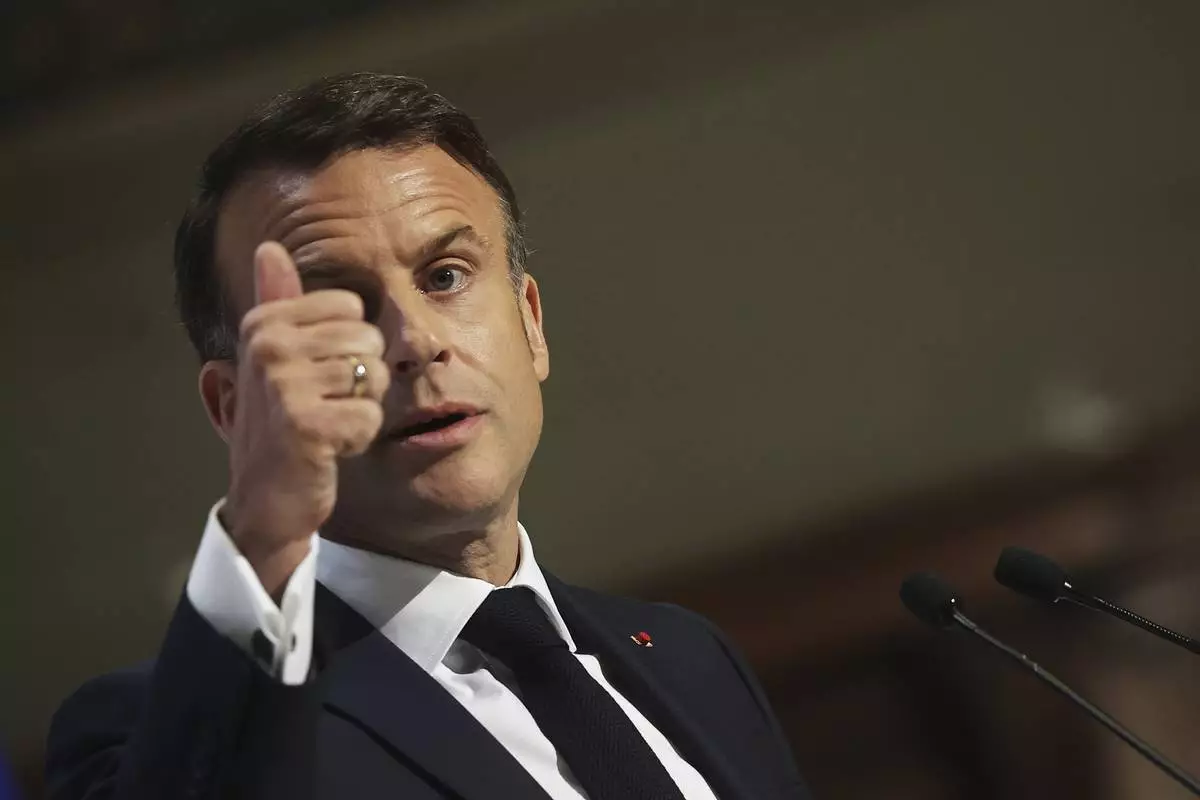
French President Emmanuel Macron delivers a speech on Europe in the amphitheater of the Sorbonne University, Thursday, April 25 in Paris. 2024. French President Emmanuel Macron will outline his vision for Europe as a more assertive global power at the backdrop of war in Ukraine, security, and economic challenges in a speech ahead of pivotal election for the European Parliament in June. (Christophe Petit Tesson, Pool via AP)
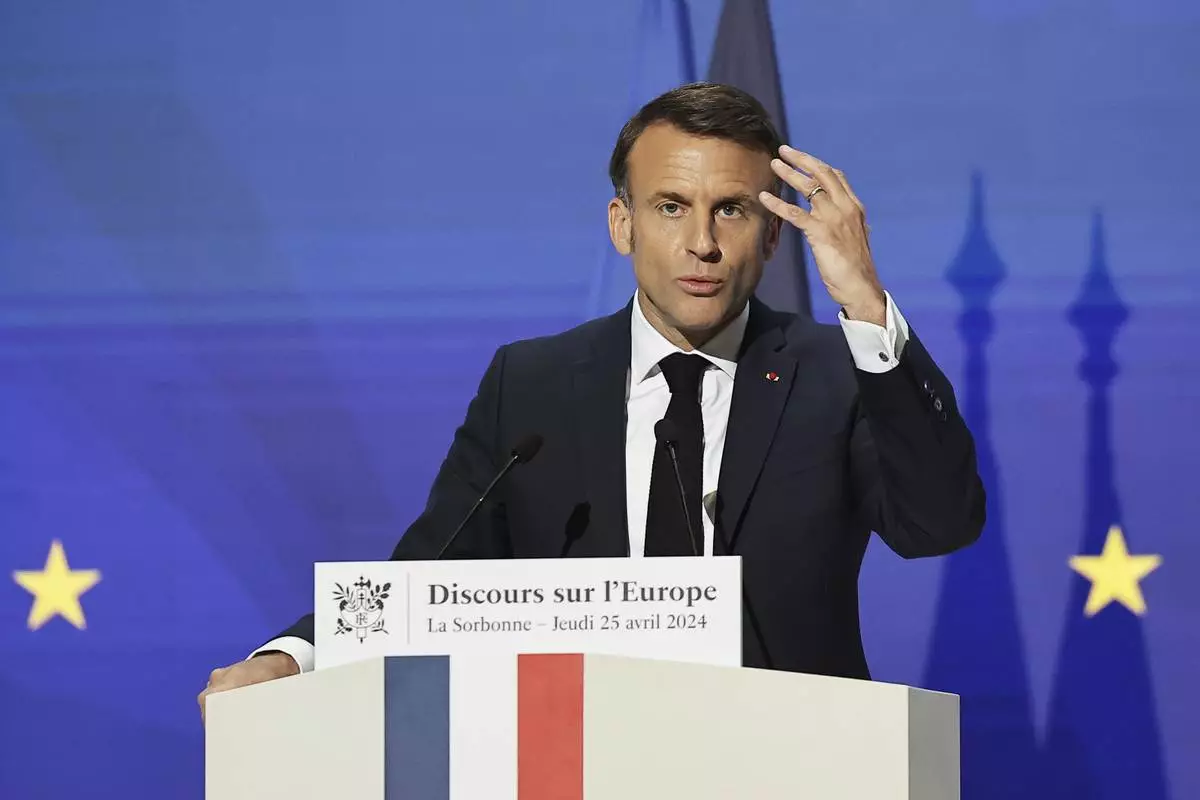
French President Emmanuel Macron delivers a speech on Europe in the amphitheater of the Sorbonne University, Thursday, April 25 in Paris. 2024. French President Emmanuel Macron will outline his vision for Europe as a more assertive global power at the backdrop of war in Ukraine, security, and economic challenges in a speech ahead of pivotal election for the European Parliament in June. (Christophe Petit Tesson, Pool via AP)
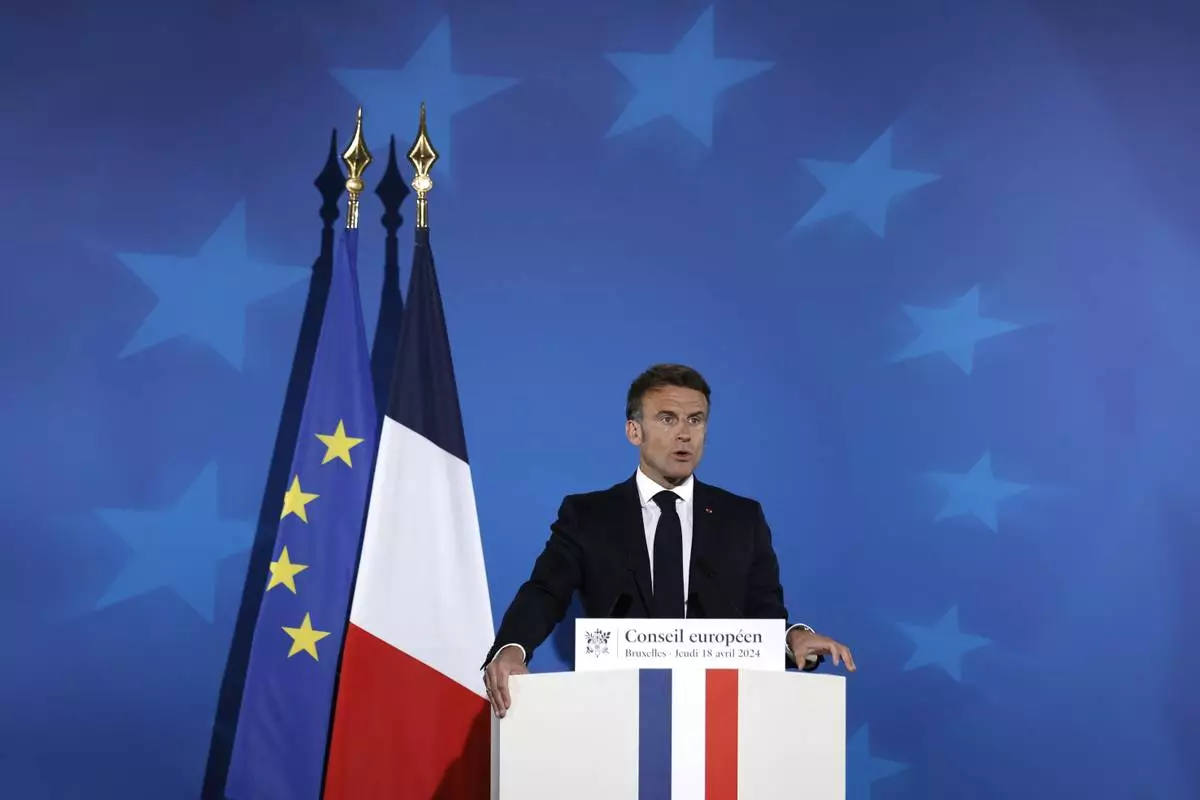
French President Emmanuel Macron speaks during a media conference at an EU summit in Brussels, Thursday, April 18, 2024. European Union leaders on Wednesday debated a new "European Competitiveness Deal" aimed at helping the 27-nation bloc close the gap with Chinese and American rivals amid fears the region's industries will otherwise be left behind for good. (AP Photo/Omar Havana)

























